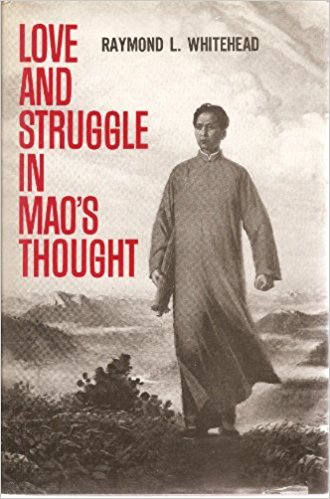In the 1970s Orbis Books was the U.S. cutting-edge publisher of books coming out of Latin America that heralded the phenomenon of liberation theology. Gustavo Gutiérrez, Leonardo Boff, and Jon Sobrino were among the authors boldly questioning the Church’s historical alignment with the rich and advocating the preferential option for the poor. A representative title was Jose Comblin’s The Church and the National Security State.
Perhaps it was the post-60s zeitgeist that accounts for a highly unusual book published in 1978: Raymond Whitehead’s Love and Struggle in Mao’s Thought. That is no typo—that’s Mao, as in Mao Zedong, Chinese revolutionary, Chairman of the Chinese Communist Party, and Evil Incarnate to the West (along with Stalin and Hitler). Just as Latin American liberation theologians and pastoral agents employed Marxist social analysis as part of their struggle against oppression, Whitehead retrieved from Mao’s thought challenges that the mainstream churches needed to confront head on. Here are some representative passages:
“Each person, whether proletarian or bourgeois, revolutionary or reactionary, can progress by struggling against selfishness, arrogance, laziness, fear, and timidity. If constant, vigilant struggle is not maintained, then one will regress.” [48]
“From the point of view of those who are suffering exploitation, the niceties of gradualism, live-and-let-live, and ‘seeing both sides of the question’ simply dodge the real issues.” [116]
“Much that passes for objective truth in the academic world is simply a defense of the injustices of the system. The search for truth is not a process that takes place in an abstract ‘free marketplace of ideas’ but is one which is very much influenced by questions of class background and the power of various groups represented in the process.” [136]
“The struggle ethic of Mao confronts us with serious questions about our values and ethics. It asks us where we stand in relation to class struggle, in relation to the oppressed of the world. It asks whom it is that we serve in our life and work. It asks whose side we are on. It asks whom we see as the enemies of the people and whether or not we are living lives of struggle and frugality and service to the people. In rejecting the liberal world view it raises the very issues with which our liberalism professes to be concerned.” [139]
“Mao will not let us in the West talk glibly about love and equality while we are living off the blood and sweat of the world’s poor.” [146]
“The centrality of class struggle in Mao’s thought and action comes as a challenge to my ethics. The question of class struggle is a question of where I stand, whom I serve, what I practice.” [148]
“Life, in Mao’s view, is more than struggle, but it is never less than struggle. Each person is constantly called on to enter the struggle, to choose a class stand, to fight selfishness, to serve the people. Social transformation, self-revolution, the need for frugality and struggle are never-ending. Revolution is permanent, but it moves toward fulfillment. That fulfillment stands only at the end of human history, for without contradiction and struggle life itself would end.” [151]
“This imperative to choose, to act, to identify with the oppressed, and to engage in self-criticism goes to the depths of my thought and life. To study Mao and the Chinese revolution is not simply an academic exercise; it is a deeply personal encounter.” [152]
In a recent balanced study of Mao, political scientist Maurice Meisner concluded this way: “The massive process of capitalist development in the decades since Mao’s death, perhaps the most dynamic process of capitalist development in world history, is thus both the product of Mao’s revolution and its negation, a capitalism that is at once the logical outcome of the Revolution that Mao Zedong led in an economically backward land and a capitalism that mocks his socialist claims and aspirations.”
Last month, I read many of Dr. Johnson’s Rambler essays, one of which had this sobering passage: “No place affords a more striking conviction of the vanity of human hopes, than a public library; for who can see the wall crowded on every side by mighty volumes, the works of laborious meditation, and accurate inquiry, now scarcely known but by the catalogue …”
Raymond Whitehead’s book of grappling with Mao may thus be marked by such vanity of human hope, that the churches would come to be self-critical regarding their complicity with class domination. Nevertheless, in the years ahead there may be a couple score people who visit U.S. public libraries and, fully aware of the relentless class war waged by the mighty against the masses of people worldwide, welcome the provocation in this heterodox book from long ago.
